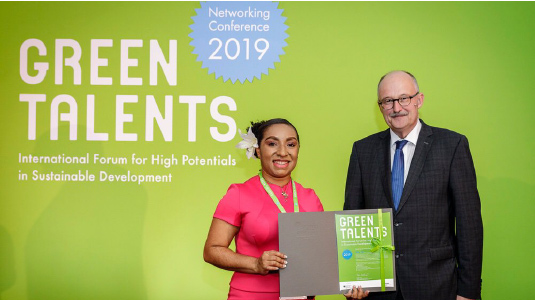SFC news published since 2018. See SFC archived content for earlier news articles.
Yalinu Poya, University of Glasgow PhD student and UK STEM Ambassador shares her award-winning research into the catalytic process that feeds the world, and encouragement for future #WomenInSTEM


Photo caption: Yalinu Poya receiving her 2019 Green Talents Award for her PhD research into sustainable ammonia synthesis from Dr Michael Meister, Parliament Secretary for the German Government.
Name: Yalinu Poya
PHD: PhD in Chemistry focusing on Heterogeneous Catalysis
University: University of Glasgow, United Kingdom
Supervisor: Professor Justin Hargreaves
The world’s food production will need to rise by 70%, as our population is expected to reach 9.1 billion by 2050. To feed so many mouths, farmers rely on fertilizers to keep food production going. The secret ingredient behind most fertilizers is a simple compound called ammonia (NH3). To keep up with global demands, ammonia needs to be produced in enormous amounts and such can only be achieved through the Haber–Bosch Process.
The Haber–Bosch Process which was developed in the early 1900’s, and was a landmark achievement of the 20th Century. Currently, the process produces over 174 million tonnes of ammonia annually, establishing an accessible route for the production of over 450 million tonnes of synthetic fertilizer which sustains food production for 40% of the global population. The process involves combining pure H2 and N2 feedstreams directly over a promoted iron catalyst at a temperature around 400°C using reaction pressures of over 100 atmospheres.
Due to the reaction conditions involved at a global scale, including the generation of feedstock, the Haber–Bosch Process currently consumes 1-2% of the world’s energy demand and produces 1.6% of man-made CO2 emissions. Although it is a mature technology, there are many challenges to make it more sustainable. By addressing its catalyst component through my research, I believe that some of the problems associated with the process could be solved, or could contribute to a greater solution.
To reduce these harmful effects and yield massive rewards economically and environmentally, there is great interest in the development of small scale local ammonia production plants based on renewable hydrogen generated from water via electrolysis and powered by sustainable electricity sources such as wind energy. In such a context, which would facilitate the production of ammonia on a localised scale i.e. such as on a farm, it is necessary to develop novel ammonia synthesis catalysts which are active under less severe operational conditions appropriate to smaller scale reactors.
My research (under supervision of Prof Justin Hargreaves, University of Glasgow) is focused on using affordable materials to make catalysts that are able to produce ammonia in a clean way using less harsh reaction conditions and energy. The Haber–Bosch Process uses its conventional iron catalysts in large scale plants, meanwhile the supported transition metal catalysts I make and use are potentially more suitable for small scale localised plants that can be powered by wind energy and its hydrogen source being extracted from water via electrolysis. The United Nations has designed and implemented 17 Sustainable Development Goals specifically to facilitate a sustainable future for the world. My research addresses 5 of these, Goal: 1 – No Poverty, 2 – Zero Hunger, 7 – Affordable and Clean Energy, 9 – Industry, Innovation and Infrastructure, and 13 – Climate Action.
As a UK STEM Ambassador, my advice to women and girls thinking of studying STEM subjects is that if you have a passion for science, please do not limit yourself, just go for it!
The world is moving forward and STEM is playing a major role shaping the present and future of our world. Women across the world are leading in STEM areas. You have to think positively and remind yourself that you can achieve anything, anything is possible. You just got to work hard and believe. I never had a female scientist role model growing up, but thought to myself perhaps I can work hard and become the role model that I never had while growing up.
Biography: Yalinu Poya graduated with her BSc. in Chemistry from University of Papua New Guinea in 2011, she then attained her MSc. in Inorganic Chemistry from the Northeast Normal University in the People’s Republic of China. She is currently a final year PhD student at the University of Glasgow, United Kingdom. Yalinu’s PhD is in heterogeneous catalysis, her research focuses on synthesising catalysts for ammonia production in the Haber–Bosch Process.
She has received wide recognition and plaudits for her research, including 9 awards, 2 of which are international awards in global competitions, including a 2019 Green Talents Award. Yalinu currently serves as: the Papua New Guinea country representative for the International Younger Chemists Network (IYCN), a U.K. STEM Ambassador and a member of the School of Chemistry Outreach Group.
Find out more, or follow her on Twitter.

